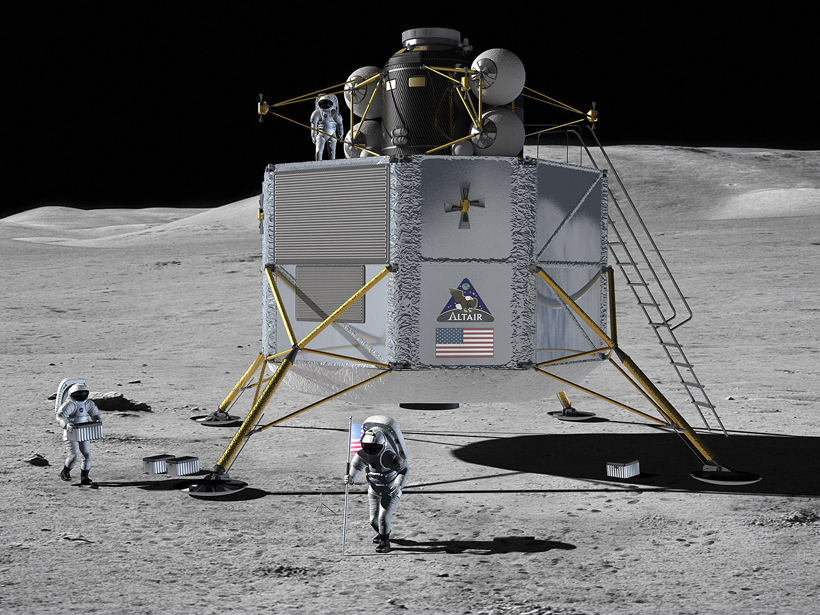Some members of Congress still fume about the White House decision in 2010 to cancel NASA’s Constellation program to return astronauts to the Moon. That resentment simmered during a hearing last week of the House Committee on Science, Space, and Technology on legislation that Republicans said would provide long-term stability to NASA, boost morale at the agency, and help with national security. Democrats at the hearing called the bill unnecessary and ill formed and claimed it could inject partisan politics into decisions related to the agency.
The Space Leadership Preservation Act (H.R. 2093), introduced by Rep. John Culberson (R-Texas), would provide a 10-year term for the NASA administrator and establish a 10-member NASA board of directors, with 3 members appointed by the president and the rest by Congress. The bill calls for the new board to propose a budget for NASA and requires the White House to offer a detailed justification for any deviations from this plan in the president’s NASA budget request.
Providing a Clear Direction
NASA lacks direction as a result of “a flawed governance structure” at the agency, Culberson testified at the 25 February hearing. Culberson, who chairs the House’s Commerce, Justice, and Science Appropriations Subcommittee, said that over the past 30 years, NASA programs have been canceled at the start of each new administration. The cancellations resulted from abrupt program changes, cost overruns, or mismanagement, he said.
“In the past 20 years alone, 27 programs have been canceled, resulting in over $20 billion wasted on uncompleted programs. That is unacceptable. Our space program is too important to continue on this path,” he said. Culberson added that the bill would help “take the politics out of science and provide NASA with clear direction and guidance that outlasts the political whims” of a president or Congress.
Agreement on Need for Stability
The legislation “unfortunately is not likely to fix the fundamental causes of instability at NASA.”
Rep. Eddie Bernice Johnson (D-Texas), the ranking minority member on the committee, agreed that NASA “will need stability” to maintain America’s leadership in space. However, she said the legislation “unfortunately is not likely to fix the fundamental causes of instability at NASA.” Johnson asserted that establishing a board with most members named by Congress would “inject partisan politics” into that proposed body. She also questioned how the board would develop a detailed NASA budget “without having to set up an unwieldy, competing administrative infrastructure of its own.”
“If we are concerned that [the White House Office of Management and Budget] is adjusting NASA’s budget request in unhealthy ways, then we in Congress already have sufficient oversight and budgetary tools at our disposal to correct the situation,” Johnson said.
General Support from Witnesses
Several witnesses spoke approvingly of the bill but questioned one element or another, including whether it made sense for the board to prepare a separate budget proposal and whether a proposed 10-year term for board members is too lengthy and might reduce the pool of candidates. However, the witnesses agreed on the need for long-term stability and shared their dismay that the Constellation program was canceled following a report on its cost overruns.
At the hearing, Colonel Eileen Collins, United States Air Force (retired), recalled her shock in finding out that the program was terminated. The decision “was so unexpected,” said the former space shuttle commander, who was a member of the NASA Advisory Council at the time. “Program cancellation decisions that are made by bureaucracies, behind closed doors and without input by the people, are divisive, damaging, cowardly, and many times more expensive in the long run,” she testified.
“Our space program is not something which the nation can afford to have be a playground for newly elected presidents and unelected staff.”
NASA is “not now on the right path,” said Michael Griffin, NASA administrator from 2005 to 2009 under President George W. Bush. “What is needed today is, first, to reestablish a sensible space policy and then consider how an efficient architecture to implement that policy might be designed,” he said. “Our space program is not something which the nation can afford to have be a playground for newly elected presidents and unelected staff,” he said, adding that Congress “is the proper repository of the long-term stability” of the agency.
National Security Concerns

Several members of Congress said at the hearing that shelving Constellation raised national security concerns about potentially ceding some of the near-space environment to other countries, including China.
Griffin and Collins concurred. “You can infer all that needs to be inferred about how China will behave in space by watching today how they are behaving in the western Pacific,” Griffin said. China recently has been building artificial islands in the region, which has troubled some neighboring nations. “There is no reason to suppose that they would behave any differently in space,” Griffin added.
Added Collins, “When the Apollo 11 crew landed on the Moon in 1969, they put a plaque that said, ‘We came in peace for all mankind.’ I’m not sure China would put a plaque like that on the Moon.”
—Randy Showstack, Staff Writer
Citation: Showstack, R. (2016), Congress tussles over bill to provide stability to NASA, Eos, 97, doi:10.1029/2016EO047373. Published on 3 March 2016.
Text © 2016. The authors. CC BY-NC 3.0
Except where otherwise noted, images are subject to copyright. Any reuse without express permission from the copyright owner is prohibited.

